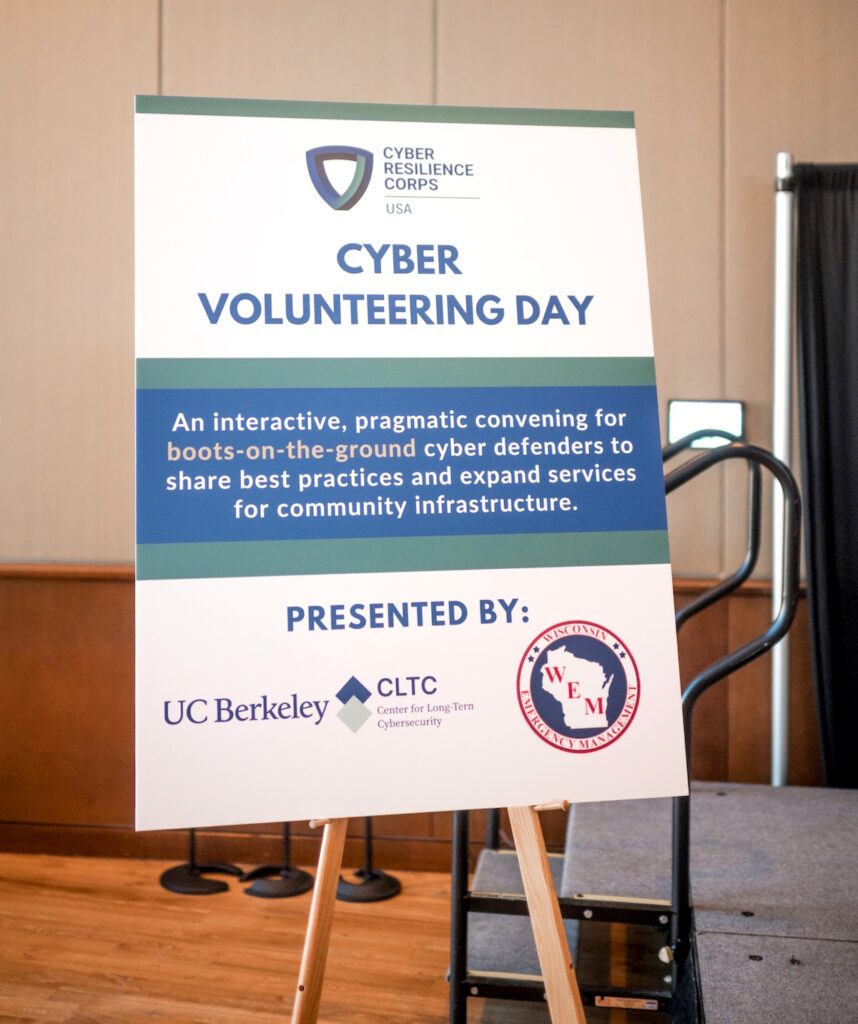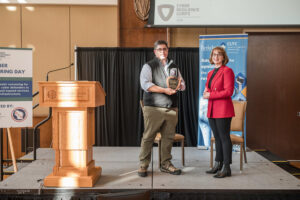
On October 23rd, the UC Berkeley Center for Long-Term Cybersecurity and Wisconsin Emergency Management were proud to host a packed room of cyber defenders across academia, state government, and civil society for the first-of-its-kind Cyber Volunteering Day. Held at the University of Wisconsin, in Madison, and made possible by Craig Newmark Philanthropies and Okta for Good, the event was an opportunity for boots-on-the-ground cyber defenders to share best practices and expand services for community infrastructure. This was the first time that state cyber corps leaders and cyber clinics across the country were in the same room together. (Read more about the event’s impact in GovTech.)

The day kicked off with a keynote from Trina Zanow, CIO for the State of Wisconsin. For Zanow, cybersecurity was top of mind during Cybersecurity Awareness Month; it is also number one on the National Association of State Chief Information Officers’ top 10 priorities of 2025. She noted that there has been an increase in phishing and vendor breaches with far-ranging attacks, and she discussed how the State of Wisconsin is meeting these challenges with a whole-of-state defense strategy utilizing innovation, partnerships, and targeted investments in cybersecurity. In particular, Wisconsin is leading the way with its fusion centers, national guard, and the Cyber Response Team, which is celebrating its 10th anniversary.

“Our greatest force multiplier… is our people and our partnerships. Wisconsin has been looked by others as the state to model because of our partnerships and connections that exist with our federal state and other states, private sector, tribal nations, schools and libraries and local and county entities.” —Trina Zanow, CIO of Wisconsin
Sarah Powazek, CLTC’s Director of Public Interest Cybersecurity, took the stage to share more about the Cyber Resilience Corps and the recently published Roadmap to Community Cyber Defense, of which cyber volunteering was a key pillar. And Jessica Walton, Regional Officer of the CyberPeace Institute, gave a demonstration of the Cyber Resilience Corps matching platform at cybervolunteers.us.

“We’re just seeing a lack of leadership [in D.C.], but we’re not seeing a lack of leadership at the state level. In fact, we’re seeing states step up in ways that they have never before.” —Sarah Powazek, Program Director of Public Interest Cybersecurity at CLTC
Eric Franco, Cyber Preparedness Coordinator for Wisconsin Emergency Management, presented an overview of Wisconsin’s innovative Cyber Response Team (CRT), which has served as a model for many other states. Franco talked about how the goal of starting up the CRT was to socialize cybersecurity statewide while integrating it into common emergency management all-hazard structures like disaster activation and business emergency operation centers. The CRT has 293 active members, responded to 57 incidents in 2025, and is estimated to have saved over $1 million for the state by providing free cybersecurity services.

‘[With the] Wisconsin Cyber Response Team, you’re looking at groups of folks volunteering their time to provide services to those entities that don’t have the resources, whether they be human resources within their organizations, or the fiscal resources, to establish and develop a team or cadre of people on on retainer.” —Eric Franco, Cyber Preparedness Coordinator, Wisconsin Emergency Management

The group then split between two concurrent breakout sessions for the afternoon. Expert facilitators from across the country lead interactive sessions on common themes across cyber volunteering, including:
- How to address cyber volunteering legal issues;
- Best practices for recruiting, onboarding, and retaining volunteers;
- Metrics and measuring success of programs;
- Collaborating and handing off post-engagement to MSPs/MSSPs;
- Public-private cooperation and information sharing; and
- Working alongside cyber insurance providers and private-sector partners.

The day concluded with a few more star sessions. First, State Senator Liz Bennett shared more about her experience in the Iowa State Legislature, and how state policymakers think, and what they need to learn, about cybersecurity. She highlighted how lawmakers don’t often understand the cybersecurity challenges of low-resource organizations, and that they can’t take action unless cybersecurity experts bring concrete asks to them.
“When you hope to influence policy, make sure that legislators understand that somebody is going to ask them why they didn’t do something, if something was was a known issue.” —State Senator Liz Bennett, Iowa
Cyber Volunteering Day wrapped with a joyful fireside chat between CLTC Executive Director Ann Cleaveland and Joshua Tannehill, Chief Warrant Officer 3 and Commander of Cyber Reserve Team (CRT) in the Louisiana State Guard. Tannehill described how Louisiana realized they needed cyber volunteers after a ransomware attack shut down many Louisiana school districts and government systems. They are now up to 50 volunteers now, and are working to extend the network to include students and increase the number of times they are mobilized to respond to cyber incidents.

The day ended with the presentation of Community Cyber Champion Awards to Eric Franco and Ray Davidson, two incredible and long-time supporters of cyber volunteering and cyber corps programs, for their outstanding leadership and impact building local cyber resilience.
CLTC will be hosting regional Cyber Civil Defense Summits across the country in 2026. Stay tuned and sign up here to learn more.




